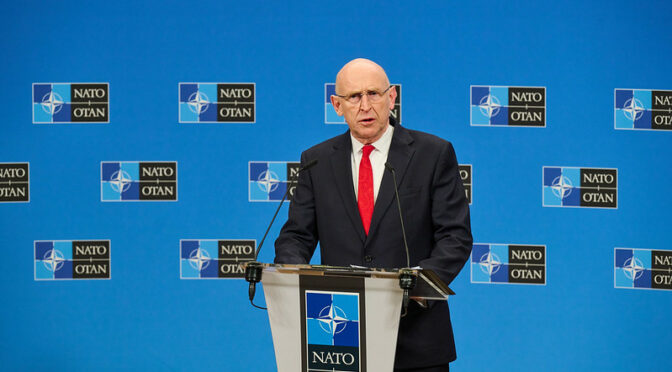Article published in The Daily Telegraph, 28 July 2025. © Richard Kemp
If Britain wants to be taken seriously on the world stage, it would do better to build up its defence capabilities than make empty threats to China. Yesterday in Australia, Defence Secretary John Healey declared that Britain would be ready to fight if a conflict breaks out over Taiwan. In other words, if China invades Taiwan, which is a distinct possibility. President Xi has made it clear he intends to bring the country under Chinese rule and has not excluded the use of force. Indeed, Beijing has been preparing for exactly that for years.
Speaking from the deck of HMS Prince of Wales, Healey said deterrence was achieved by securing ‘peace through strength’. He’s right about that, but deterrence is based on actual military strength, not mere words. Britain no longer has anything close to the military power it needs, and certainly not sufficient to fight a war in the Pacific, even alongside allies. It’s one thing to dock an aircraft carrier in Darwin and sail freedom of navigation patrols through the benign Taiwan Strait. It is quite another to engage in combat against a nuclear-armed power with the largest army and navy in the world.
For that matter, despite the value for diplomacy and national prestige of a series of flag-waving tours around the Pacific, would it not be better to deploy the HMS Prince of Wales to confront Chinese-sponsored aggression in the Red Sea? For almost two years, the Houthis have been harassing and attacking international shipping there, yet both our carriers have been kept safely away. Earlier in the year a British tanker was set on fire by a Houthi missile and the next month a British cargo vessel had to be abandoned after it was hit. Having sunk two ships so far this month, the Houthis vowed yesterday to step up their attacks.
The Houthis’ aggression is supported by the regime in Beijing, which supplies them with parts for missiles and drones as well as software and satellite intelligence for targeting ships. Instead of dealing with this present threat and sending a real deterrent message to China, we are pulling our last remaining frigate out of the region, to return home to the scrapyard. That will leave just a solitary minesweeper in Bahrain, with no other warships available.
That’s hardly surprising. The once mighty Royal Navy surface fleet is now down to 14 frigates and destroyers, of which only around half are available at any time, plus the two carriers. After decades of cuts, the Army and Royal Air Force are in an equally enfeebled state. In view of this, Healey’s words are unlikely to give Beijing’s political leaders or military planners furrowed brows never mind cause them to re-think their planned aggression. Nor will the recent defence review’s findings. Against the new Nato benchmark requiring 5 per cent of GDP to be spent on defence, the Government has said it will increase to 2.5 per cent by the end of this parliament with less-than-convincing assurances of an increase to 3.5 per cent by 2034.
Healey’s promised ‘peace through strength’ requires not only military but also political strength. Starmer’s ‘coalition of the willing’ plans to deploy UK ground forces to Ukraine now seem to have evaporated altogether and we don’t have the resolve necessary to defend our own shores from rubber boat flotillas. Even if we had the wherewithal to fight the Chinese, our Government would no more send British sailors to meet their fate in the Pacific than to send infantrymen to fight and die in Eastern Europe. And don’t think Xi Jinping doesn’t know it.
Image: Nato/Flickr

